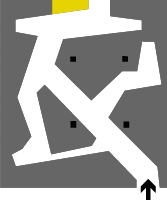Karl Rupitsch 1910 - 1944
Born 17.11.1910 in Mühlbach
Died 28.10.1944 in Mauthausen
Biography
Karl was the youngest of seven siblings and became a widower and father of four early on. In 1936 he sold his mountain farm in Mühlbach and went to work in a sawmill in Goldegg. Because of a knee injury, he was exempt from military service but did occasionally serve in the Reichsarbeitsdienst (Reich Labour Service) in local sawmills. His anti-National Socialist attitude brought him into contact with the resistance group led by Kaspar Wind in St. Johann im Pongau (then Markt Pongau).
In November 1943 Rupitsch was arrested for the illegal slaughter of animals and admitted to the prison in St. Johann i.P. From there he was freed by his friends Kaspar Wind and Alois Buder. They too were later executed in Mauthausen on 28 October 1944. Buder took him to the Vorderbrandstätt farm in Taxenbach, where Rupitsch had found shelter and food on several occasions, later together with several other deserters. On receiving his call-up papers in the following days, Karl Rupitsch decided not to join up but to go into hiding. As an opponent of the Nazi regime, he declared that he was refusing military service since he condemned the war and did not want to shoot at people who had done nothing to him.
Over time he was joined by several other famers’ sons from Goldegg who did not return to the front after home leave. They sought hiding places on the mountain pastures, in hay barns, sometimes on local farms, where they were also given food.
When investigations by the local police drew a blank, in spring 1944 spies of the Gestapo Salzburg infiltrated the area in preparation for a large-scale campaign. In the night of 1 to 2 July 1944, 1,000 SS men and 60 members of the criminal police and the Gestapo combed the mountain area around Goldegg-Weng. Karl Rupitsch was eventually discovered at his girlfriend’s house on Unterdorfgut farm. She and her siblings were subjected to brutal mistreatment. Two of her brothers were ruthlessly murdered during the raid through a shot to the heart. One deserter died fighting the SS. Of the six deserters, only one escaped; he lay low in Taxenbach until the end of the war. In the course of this ‘storm’ over Goldegg, over 40 people, half of them women, were arrested and many deported to concentration camps. At interrogations in Salzburg, the Gestapo applied brute force.
Following interrogation, Karl Rupitsch was sent to the Natzweiler-Schömberg concentration camp and was deported from there to Mauthausen concentration camp on 12 August 1944. Nine days before his execution, he was deployed to the St. Valentin subcamp as a disinfector. On Sunday 28 October 1944, Karl Rupitsch, ‘by order of the Reich Chief of the SS’ was finally executed by means of ‘death by hanging’ along with three of his friends from the resistance and a further 46 prisoners. In total, the tragedy of Goldegg claimed 14 victims.
Emma Brigitte Höfert
Sources:
Michael Mooslechner: Wehrmachtsdeserteure auf Salzburger Almen. Die Gruppe um Karl Rupitsch in Goldegg und ihre Zerschlagung am 2. Juli 1944 [Wehrmacht Deserters in the Salzburg Foothills. The group around Karl Rupitsch in Goldegg and its destruction on 2 July 1944]. In: Thomas Geldmacher / Magnus Koch / Hannes Metzler/ Peter Pirker / Lisa Rettl (ed.): “Da machen wir nicht mehr mit ...” Österreichische Soldaten und Zivilisten vor Gerichten der Wehrmacht [‘We’ll not be part of that any more…’ Austrian soldiers and civilians appearing before military courts] (Vienna 2010), p. 167–173.
Robert Stadler / Michael Mooslechner: St. Johann 1938–1945. Das nationalsozialistische “Markt Pongau”. Der “2. Juli 1944” in Goldegg: Widerstand und Verfolgung [St. Johann 1930–1945. National Socialist ‘Markt Pongau’. The ‘2 July 1944’ in Goldegg: Resistance and Persecution] (Salzburg 1986).
Translation into English: Joanna White
Location In room

